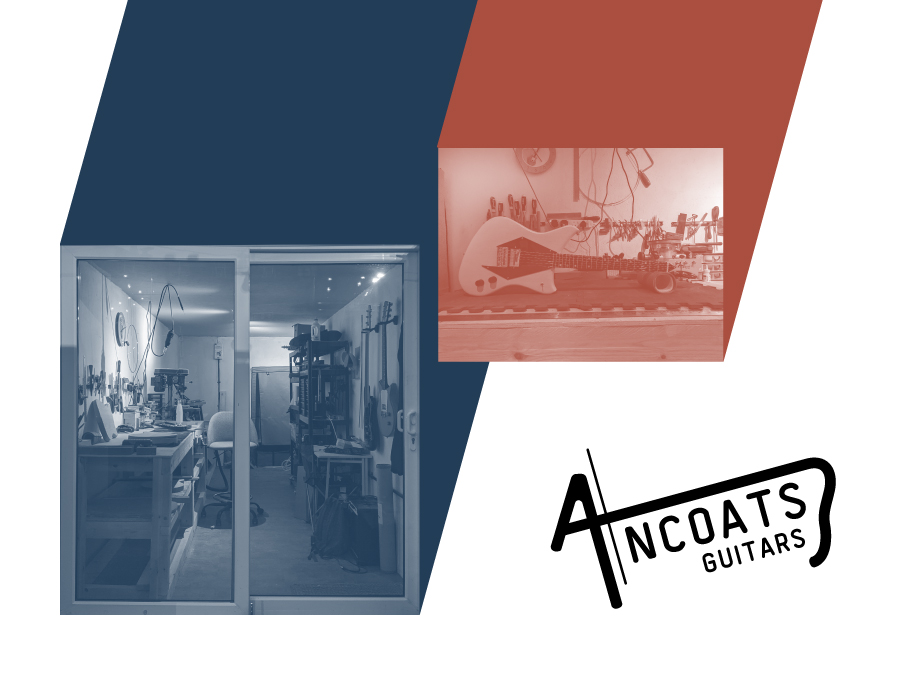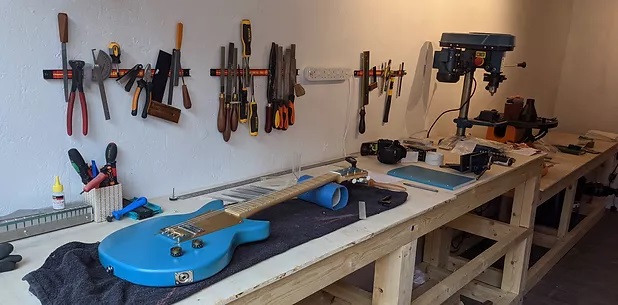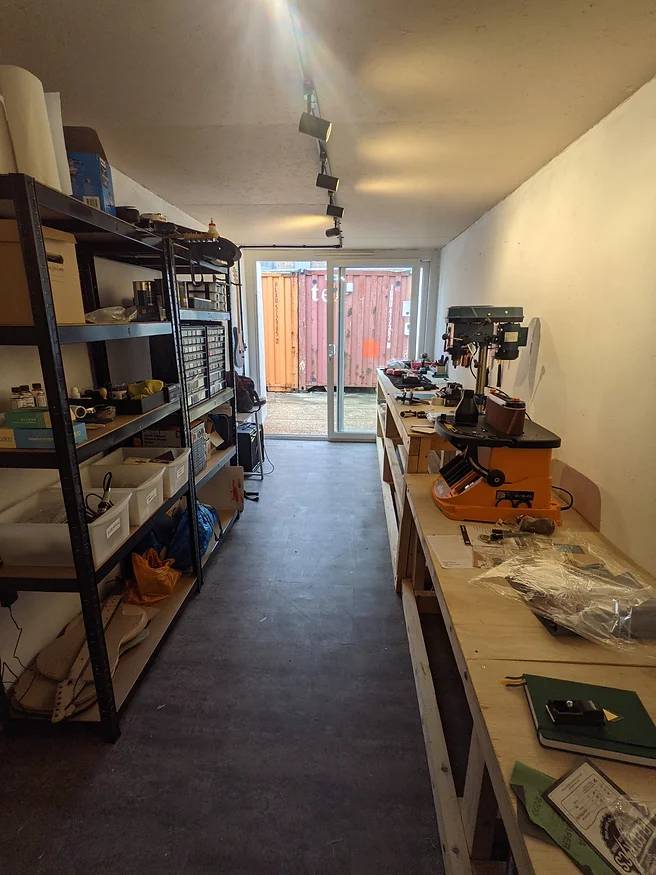It can be a sensible plan to start your new enterprise as a side hustle. However, the time may well arise when you have to make that leap and make a significant commitment to your start-up.
The good news is that you don’t necessarily need to jump right into the deep end. Dave Roberts of Ancoats Guitars has been on this journey throughout the year, taking incremental leaps towards a life devoted to his guitar building business. As Dave told us recently at The London International Guitar Show:
“It started off as a side hustle, but it’s taken over my life!”
Making an investment
The first commitment demanded by your fledgling business might come in the shape of a sizable investment. That could be signing the lease on a workspace, bulk-buying materials or acquiring equipment. Sunk costs like these, known to the business world as ‘capex’ or capital expenditure, can tie you into your project for as long as it takes to recoup your investment.
Tools of the trade
For Dave it was at this point when things started to get real:
“Probably the first scary moment for me was investing in the tooling I needed to start production on a decent scale. I knew at that point that I’d have to turn out a good few guitars before I covered my costs and started to turn a profit.”
For many entrepreneurs, an investment along these lines might be the first test of their commitment to their venture. It can take patience, thick skin and a decent nest egg to weather the early years. After all, on average, new businesses in the UK trade for around three years before turning a profit.
Outside investment is an option, and can be easier to come by than many small businesses realise, but it does come with its own set of commitments in terms of repayment, or even sacrificing a stake in the new company.
If you opt for a business loan, the bank may request personal property and assets to be put up as collateral against the loan to ensure they can recoup any losses should things go South. A sobering prospect that should give any would-be entrepreneur pause to consider the wisdom of their venture, and whether they’re prepared to face the consequences should it fail.
Without this leap however, your business may struggle to scale up. Weigh up your options carefully at this point: by all means back yourself, but avoid overreaching. Start small if possible, investing just enough to put your toe in the market. If you can gauge demand on a small scale, you allow yourself room to amend your product or pivot your plan if necessary.
A place of work
From the very outset, it was clear that Dave’s guitar building activities would require a permanent home. The answer came in the shape of a converted shipping container in the traditionally industrial area of Manchester that gives his company its name. This proved to be an inspired choice:
“Ancoats Guitars’ current HQ is perfect for my needs. It’s large enough to house everything I need for production at present levels, without being extravagantly costly. And being situated among other manufacturers, I can make all the noise I want!”
For those with modest space requirements and a spare room or garage, the home can be a good place to start. If you begin to feel like you’re sacrificing your comfort or family relationships, it’s probably time to find a dedicated space. Follow Dave’s example and find somewhere both affordable and appropriate to the nature of your business.
Enough hours in the day?
As long as your new business and your existing job can coincide for a while, it can be a good idea to keep them both running in tandem. Chances are your new venture speaks to your passions in life, so hopefully it won’t feel like too much of a burden.
However, if this state of affairs is allowed to drift into a long-term arrangement, it could lead to burnout. Be sure to look after yourself, stay aware of how you devote your reserves of time and energy, and set aside time to relax.
Crossroads Blues
As well as building beautiful instruments, Dave is a highly-trained medical professional, working in a hospital radiology department. Dividing his attention between a hard won career and a passion for electric guitars, Dave spent much of his first year burning the candle at both ends.
“As orders really took off, I did begin to feel the pressure. I started the business to pursue my passion for making guitars. The idea of that becoming an extra stress felt like a step backwards. That was a cue for me to look at reducing my hours at work.”
In recent weeks, Dave made the decision to go part time at the hospital, lending him far more time to devote to Ancoats Guitars, and giving him back his weekends!
“I’ve cut down my hours to two and a half days a week now, so Ancoats Guitars is now my part time job. Or I hope it will be if I can sell enough guitars and make up the money! Things are looking good though, I’m getting plenty of orders in.”
Part-time work is a great option when business starts to take off. If you have financial commitments like a mortgage, you may welcome the reassurance of a regular salary. At the same time, you can devote the extra hours away from the day job to making sure your new venture takes off. That might mean seeking a part-time job, or approaching your current employer and asking to cut down your hours, as Dave was able to do.
Dividing your time
Going part-time might be an interim state of affairs. It could serve as a secure stepping stone before you go full-time with your other business. Alternatively, you might decide that it’s a lasting solution that lets you divide your time while spreading the risk.
More and more people are embracing a “portfolio career,” where they spread their efforts between two or more income streams. Security in diversity and a varied work life make it an attractive alternative to the nine-to-five. Your new business could slot into a more permanent arrangement where you pursue multiple passions. This approach is less like a leap into the unknown and more akin to distributing your weight evenly between different platforms.
The next leap forward
For Dave Roberts, this is a time of settling into the fifty-fifty split between his medical career and Ancoats Guitars. It’s a fortunate position that allows him to gauge demand for his guitars and make informed judgments about how to prioritise his time.
“I’ve spoken to some people who’ve quit their job and jumped straight in. They’ve said they wouldn’t be able to focus on it or give it enough time, but I couldn’t have done that. I’ve got a mortgage!”
Dreams vs. Reality
Following our dreams and maintaining our financial security are both vitally important, but they don’t have to be incompatible with one another. With careful planning and a realistic outlook, it’s possible to reconcile the two, just like Dave.
There are times when an element of risk is inevitable. You take a punt and hope things will work out. It can be all too easy to overstretch your resources, whether that’s your time, your energy or your money. However, by easing your way into full-time entrepreneurship, it can feel less like making a leap and more like building a bridge.
As he looks to 2023 and beyond, Dave is in a great position to pursue his passion – and also pay his mortgage!








